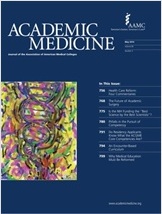President Gerhart Casper, Provost Condolezza Rice, and Dean Richard Shavelson, Stanford University, requested an evaluation of the Stanford Teacher Education Program. It was a complex, multi-dimensional evaluation, focusing educational theory, curriculum, and instructional practice.
The evaluation was well received by Professor Linda Darling-Hammond. She used the findings to revitalize the teacher training program. The final report is available online.
In addition, this evaluation was used as a model in teacher education programs throughout the United States. It has also been discussed in some depth in the literature. An interview and discussion about the evaluation and the methodological, personal, and political dynamics associated with conducting an evaluation in your own school is presented in the American Journal of Evaluation.
A brief introduction or overview about the program and evaluation is available here. The interview and dialogue is available here.
School of Medicine Accreditation
Dean Phillip Pizzo and Associate Dean Julie Parsonnet authorized Dr. Fetterman to create and direct a division of evaluation in the School of Medicine, Stanford University. In addition to creating the office, developing the office's web page, and reporting to the Faculty Senate, Dr. Fetterman lead and facilitated the evaluation component of the School's accreditation team. The School passed accreditation with "flying colors." A summary of how the empowerment evaluation approach was applied to the accreditation effort was published in Academic Medicine.
The article is available online at the Academic Medicine site and upon request. The citation is:
Fetterman, D.M., Dietz, J., and Gesundheit, N. (2010). Empowerment evaluation: A collaborative approach to evaluating and transforming a medical school curriculum. Academic Medicine, 85(5):813-820.
Dr. Fetterman's work in this area has also had an impact internationally, resulting in numerous requests for his assistance. His article in Ensaio, a Brazilian professsional journal, highlights in some measure the wide-reaching nature of the impact of his work in this area. The citation for that article is presented below:
Empowerment evaluation at the Stanford University School of Medicine: Using a critical friend to improve the clerkship experience. Ensaio: Avaliacao e Politicas Ppublicas em Educacao. Rio de Janeiro, 17(63):197-204.
Dr. Fetterman also jointly published an article in JAMA that received national attention, ranging from ABC to CNN and a variety of major media outlets throughout the country. The article highlights Medical School Deans' views concerning the paucity of LGBT-related material in medical curriculum. The citation is: Obedin-Maliver, J., Goldsmith, E.S., Stewart, L., White, W., Tran, E., Brenman, S., Wells,M., Fetterman, D.M., Garcia, G., Lunn, M.R. (2011). Lesbian, Gay, Bisexual, and Transgender-Related Content in Undergraduate Medical Education. JAMA, 306(9):971-977. This article is having an impact on medical school curriculum throughout the United State.
Dr. Fetterman has conducted numerous workshops and presenations throughout the United Stated and Internationally, based on the evaluation model he established and implemented, including the Association of American Medical Colleges professional meetings. He also writes about medical issues for general audiences. His story about his son's pyloric stenosis is an excellent example.
Environmental Health and Safety
President Donald Kennedy, Stanford University, requested an environmental health and safety evaluation, to investigate and respond to allegations of intimidation, cover-up, unethical behavior, and waste and mismanagement in Stanford University's Environmental Health and Safety Facility.
Dr. Fetterman was selected to conduct the sensitve evaluation. His work was reviewed and scrutinized by a Blue Ribbon Committee consisting of Nobel Laureate Kenneth Arrow, Assemblyman Calvo, former US Commissioner of Education, Judge Hofstadler, and others. Dr. Fetterman's conclusions were considerd honest, balanced., and timely.
The findings were reported in the press throughout the United States, including the Associated Press. Local San Jose Mercury coverage was extensive and required Dr. Fetterman's periodic commentary to provide additional context to his findings. His report is available online. In addition, the evaluation resulted in a Chronicle of Higher Education article: Health and Safety Issues: Colleges Must Take Steps to Avert Serious Problems.
This article had an impact on policies and practices of environmental health and safety departments in universities throughout the United States, particularly focusing on organizational conflicts of interest.
Dr. Fetterman has conducted hundreds of evaluations for Stanford University over a 25 year period of service, ranging from the Controller's Office to the Stanford Linear Accelerator.
He received the Outstanding Higher Educational Professional Award and the Stanford University Osmond Chung Award for his evaluation contributions to the institution.



